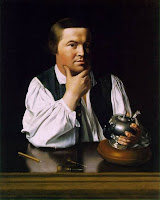Patriots:
They called themselves like these all people that fight against the brittish control and helped in the revolution of the US to accpomplished.
Loyalists:
Were the ones who were agreeing with the control of brittish and like the organization brittish had over the colonies, but they were scared of the patriots
patriots and loyalists
Daughters of liberty
sons of liberty
Biography: Paul Revere

Description:
An American patriot and silversmith, Paul Revere was born in Boston, Jan. 1, 1735, and died May 10, 1818. Revere became a legendary hero at the start of the American Revolution, when he rode from Charlestown to Lexington, Mass., on the night of Apr. 18, 1775, to warn the countryside of approaching British troops.
Born in Boston on January 1, 1735, this hero was the son of a silversmith. Like his father, Revere learned how to make all kinds of things. He was able to supplement his income in the economic depression before the Revolution by creating tools, copper plates, and even fake teeth. Besides working as a silversmith, Revere was a soldier for a short time during the French and Indian War. The British and the French were at war over territory in North America.
In August 1757 he married Sarah Orne with whom he had eight children. Shortly after her death in 1773 he married Rachel Walker, and together they had another eight children.
In the 1770s, Revere became a strong supporter of American independence. He was a member of the 'Sons of Liberty', a group of patriots in who took their name from a debate on the Stamp Act in Parliament in 1765. He joined with 50 other revolutionaries in the Boston Tea Party, an event in 1773 when American colonists destroyed many crates of tea on ships in Boston Harbor. This event was a protest against the English tax on tea in the colonies. The colonists didn't have any say about the new taxes. And they didn't have anyone in the English government to support their cause. This was called "taxation without representation." The incident has been seen as helping to spark the American Revolution.
Samuel Adams Quote:
Samuel Adams
American Patriot & Politician
1722 - 1803
"If ye love wealth greater than liberty, the tranquility of servitude
greater than the animating contest for freedom, go home from us
in peace. We seek not your counsel, nor your arms. Crouch down
and lick the hand that feeds you; May your chains set lightly upon
you, and may posterity forget that ye were our countrymen."
Biography: Samuel Adams

Samuel Adams was born in Boston, Massachusetts on September 27, 1722.. He was a leader of the fight against British colonial rule, and a signer of the Declaration of Independence. Adams was a cousin of John Adams who became the second President of the United States.
Adams' father, a deacon of the church and successful brewer, played a prominent role in Boston politics. When Samuel was a young man, the royal government ruled the senior Adams' investments illegal, ruining him financially. This may have been the cause of Samuel's animosity toward and opposition to colonial authority.
Samuel Adams graduated in 1743 from Harvard College with a Master of Arts degree. After college he entered private business, and throughout this period was an outspoken participant in Boston town meetings. When his business failed in 1764 Adams entered politics full-time, and was elected to the Massachusetts legislature. He lead the effort to establish a committee of correspondence that published a Declaration of Colonial Rights he had written.
Adams was a vocal opponent of several laws passed by the British Parliament to raise revenue in the American Colonies. By 1773, Adams and his Boston associates had pressured England to rescind all these measures but one, the Tea Act. The Tea Act granted the British East India company a monopoly on the sale of tea to the colonies, and included a tax paid to the British crown. Opposition reached its peak on December 16, 1773 when a group of Bostonians dumped a British cargo of tea into Boston Harbor. This act of resistance is referred to as the Boston Tea Party.
The British Parliament responded to the "Boston Tea Party" by passing a set of laws referred to as the "Intolerable Acts." These laws included the closing of Boston Harbor and the restriction town meetings. Adams then urged a general boycott of British trade by the American Colonies.
In 1774 the Massachusetts legislature send Adams and four others as its representatives to the First Continental Congress. Adams served Massachusetts again at the Second Continental Congress where he was an advocate for independence and confederation for the American Colonies.
Adams served Continental Congress until his return to Boston in 1781. He initially opposed the new Constitution of the United States, but finally supported its ratification in Massachusetts. Adams served as Governor of Massachusetts from 1793 to 1797.







